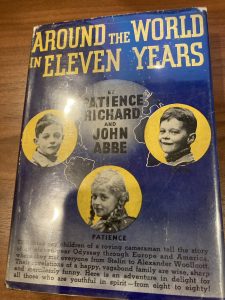Around the World in Eleven Years
And speaking of memoirs about living in Nazi Germany, as I believe we were, allow me to introduce you to Around the World in Eleven Years, possibly the most unusual memoir of the period.
Published in 1936, the book was purportedly written by eleven-year-old Patience Abbe with occasional input her younger brothers Richard, and John. According to family lore, as reported in Abbe’s obituaries in 2012, the book was inspired by their mother, actress and former Ziegfeld girl Polly Abbe, who transcribed the children’s stories. Around the World in Eleven Years tells the story of the children’s nomadic childhood in Europe, following their father, photographer James Abbe, from France to Germany, Austria, Russia and England, returning “home” to the United States for the first time when Patience was eleven.
The book was an immediate best-seller, going through sixteen printings in its first year, perhaps because readers were eager to read what the reviewer in the Los Angles Times described as a “chronicle of rollicking kids” that smoothed the edges off the increasingly difficult news from Europe.*
James Abbe was one of the best known photographers of the 1920s and 1930s. He originally made his name as a stage and film photographer with portraits of Hollywood stars such as Mary Pickford, Charlie Chaplin and Lillian Gish. In the late 1920s James turned increasingly to photojournalism. His work included an exclusive photo session with Stalin in the Kremlin, documenting the rise of the Nazis in Germany, and images of the Spanish Civil War.
While there is no doubt that at least one adult, and probably several, edited Patricia’s stories, they retain a child’s eye view. Around the World in Eleven Days offered readers an innocent but sharp-eyed counterpoint to James Abbe’s photographs. In it, “I, Patience” described a Nazi march, in which her mother got entangled and crossing the Russian border with her father’s negatives wrapped around her brother’s bellies so the Soviets didn’t seize them. She talked about going to school in Nazi Germany, where they had to salute their teachers and say “Heil Hitler!”, and in Russia where she learned a communist version of “London Bridge is Falling Down.” She also shared her impressions of the people they met, including Sigrid Schultz:** “Aunt Sigrid is a little lady with golden hair and blue eyes and beautiful teeth. She is always smiling…She helps lots of people and speaks four languages. She is also very chic and always had parties and Mamma used to go to them all the time.” Sigrid Schultz in a nutshell.
Once back in America, the Abbe family traveled cross country from New York to Hollywood, where they finally made their home. Instead of meeting politicians and foreign correspondents, they met movie stars. (Patience once danced standing on Fred Astaire’s shoes for a photo shoot.)
Patience (or possibly Polly) ended the book with their dreams for further travels: “We would go to China. Richard wants to see the gold on the King’s house in China. Johnny wants to see the robber. I, Patience, want to see everything.” Hard to disagree with that, Patience.
**Just to put it in context here are a few high points, or low points, in the news in 1936 for those of you who don’t have the chronology in your head:
❦ March Hitler sent troops into the demilitarized Rhineland zone and renounced the Locarno, finally destroying any illusion that Germany would honor the Versailles treaty. It was Hitler’s first military action.
❦ May Italy conquered Ethiopia.
❦ July The Spanish Civil War began.
❦ August Berlin hosted the Olympics, presenting a whitewashed view of Nazi Germany to the world
❦ Also August In Russia, the dramatic trials began that would develop into Stalin’s first round purges, known as the Great Terror
❦ October Hitler and Mussolini signed the first of several treating, creating the Rome-Berlin Axis
Not a good year, with worse to follow. (In a recent post I promised to try to use “horticultural dingbats” here on the blog. I found they were too fussy to replace asterisks but are a more gentle choice than “bullets” for a list. Though bullets might be the appropriate choice for this particular list.)
** You knew there was a reason I read this book.





